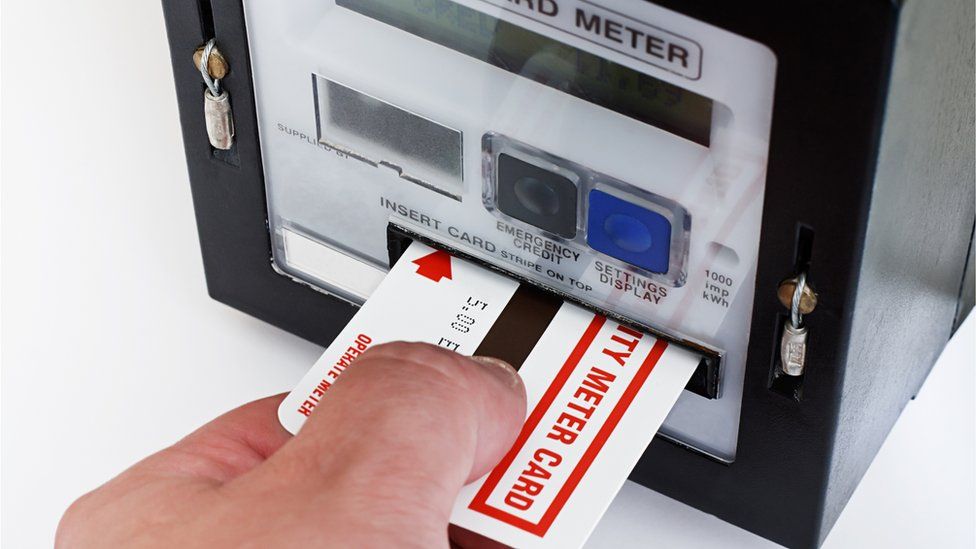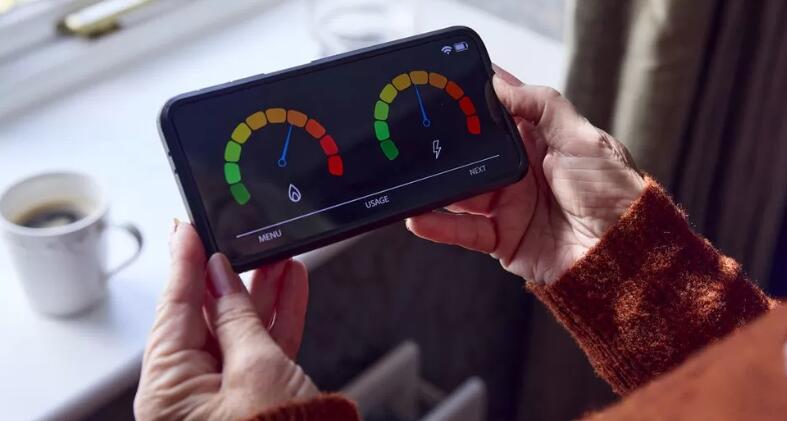Citizens Advice has called for a ban on energy companies “forcing” customers onto prepayment meters because they are struggling to pay bills.
The charity estimates that 600,000 people were put onto the pay-as-you-go method last year, with 160,000 more expected by the end of the winter.
Some have meters installed, while others have smart meters automatically switched to prepayment mode.
Ministers said energy firms must offer extra help to struggling customers.
People using prepayment meters pay for their gas and electricity by topping up their meter, either through accounts or by adding credit to a card in a convenience store or post office.
This is a more expensive method of paying than by direct debit, but is sometimes the only option for people who have struggled to pay and are in debt to an energy supplier. Many rented properties also have prepayment meters.
Problems can arise when residents no longer have any credit left on the meter, and have no money to top it up – leaving them unable to cook or heat their homes.
Citizens Advice estimates that 3.2 million people across Britain ran out of credit on their prepayment meter last year, the equivalent of one every 10 seconds. The advisory service said it saw more people who were unable to top up their prepayment meter in 2022 than in the whole of the last 10 years combined.
- Who can get the latest cost-of-living payments?
In November, the BBC revealed how a rising number of households were having their energy smart meters remotely switched to prepayment meters.
Suppliers can use the technology to swap customers onto the prepayment method without their permission.
Citizens Advice is calling for a ban on this practice, as well as ruling out energy suppliers going into homes to fit prepayment meters, until more protection is put in place.
It gave the example of one of the charity’s clients who said her power went off just before Christmas, and later discovered her meter had been switched to prepayment mode.
“I assumed it was a power cut. I had no way to make any calls, so my daughter and I were left in the dark all night with no heating, lights or means of making any food,” she told the charity.
“I explained that I was on the priority services register. I also said I’m in a wheelchair and unable to access my meter, but none of it made a difference. I’m now reliant on my sister or her husband to go to the post office to help me top up my meter.
“Over Christmas I went without energy because the credit ran out, and the post office was closed, so my daughter and I sat there cold, in the dark.”

The charity said it had heard other cases including when someone unable to top up even though their medication needed to be refrigerated, or a single parent with a young baby left without light or heat for 48 hours because she could not afford to put money on the meter.
It said one in five households including someone who is disabled or long-term sick, which ran out of credit last year, went on to spend two days or more without an energy supply.
Dame Clare Moriarty, chief executive of Citizens Advice, said: “The staggering rise in the cost of living means many simply cannot afford to heat and power their homes to safe levels.
“New protections are needed to stop people being fully cut off from gas and electricity. Until then, there must be a total ban on energy companies forcing those already at breaking point onto prepayment meters.”
Ofgem stipulates that certain groups such as disabled people and those with long-term health conditions should not be forced on to a prepayment meter.
However, Ofgem and Citizens Advice said people could choose to move to prepayment if they wished.
Last year, regulator Ofgem wrote to suppliers about the issue.
A government spokesman said it expected energy suppliers to do all they could to help customers who were struggling to pay their bills.
“Suppliers can only install prepayment meters without consent to recover debt as a last resort,” he said.
He added that Ofgem required energy suppliers to offer solutions for customers in, or at risk of, debt or disconnection.
“This includes offering emergency credit to all prepayment meter customers and additional support credit to customers in vulnerable circumstances.”
Simon Francis, co-ordinator of the End Fuel Poverty Coalition, said: “The staggering extent of the prepayment meters scandal is now clear.
“A full ban on the forced transfer of customers to prepayment meters, including via smart meter mode switching, is now the only acceptable course of action.”



